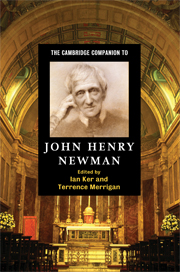9 - Authority in the Church
Published online by Cambridge University Press: 28 May 2009
Summary
For John Henry Newman the problem of authority in the Church was a lifelong preoccupation. He believed from boyhood in authoritative Scriptures and creeds, and as he grew older he pondered the question of authority in the Church. Was it located in bishops, in popes, in theologians, in lay persons, or in all together? In case of conflict, whose voice should prevail? Committed though he was to an authoritative revelation, Newman cannot fairly be categorized as authoritarian. He was keenly aware of the rights of reason and the possibilities that authority would be abused. But he was sceptical enough to distrust the competence of pure reason in matters of religious truth. As we shall see, he generally preferred to use different authorities in the Church to supplement and counterbalance one another. Newman believed that authority had a place even in pagan religions. Although revelation was present only in a vague and diffuse way in these 'natural' or 'traditionary' religions, God made his voice audible in them, enabling even the heathen to make acts of faith. In a sermon of 1830 he declared: 'The prerogative of Christians consists in the possession, not of exclusive knowledge and spiritual aid, but of gifts high and peculiar'. Although God's self-manifestation through the Incarnation is a singular and inestimable benefit, 'yet its absence is supplied to a degree . . . in those various traditions concerning Divine Providences and Dispensations which are scattered through the heathen mythologies'. In his first book, The Arians of the Fourth Century (1833), he quotes Clement of Alexandria and other Fathers to the effect that 'there never was a time when God has not spoken to man', creating the possibility of saving faith.
- Type
- Chapter
- Information
- The Cambridge Companion to John Henry Newman , pp. 170 - 188Publisher: Cambridge University PressPrint publication year: 2009
- 3
- Cited by



